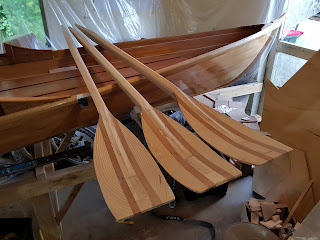Nowadays, "bodging" means doing a shoddy job or perhaps fixing something using the wrong materials. Bodge and botch have merged in meaning. Strange, since, originally, a bodger was a highly skilled craftsman: a woodworker in the furniture industry. Their particular expertise was in shaping wood to make, for example, chairs. I am guessing that the term related to forcing something (wood) to fulfil a different purpose, hence the idea of a bodge being a fix or shortcut. Bear with me, I'll research further.. or perhaps not.
Back to the oars...
They're shaping up beautifully as a result of a huge amount of sanding and careful planing. (Yes, planing, not planning.) Having transformed them and wiped off the blood and sweat, I proudly showed them to Joe, recently returned from his fact finding mission beyond the Wall, who commented that they needed a lot of work and went off to get a pie.
OK, he is right. The tricky challenge is shaping the surface of the spoons, so that there are concave scoops, on either side of the spoon, up to the spine or ridge that is the continuation of the loom. These also taper away towards the tip of the spoon, so there's a complex set of curves to be achieved. In addition, they have to be consistent on all four blades. This old skiff blade might give an idea of the desired result:
 |
| Someone prepared this earlier, then couldn't wait and took a bite from it. |
The mahogany strips in our blades, being relatively hard, make our spoons doubly difficult to work.
So, I have been searching for a way of creating a concave shape. One solution is to wrap sandpaper around a suitably curved block (the curve is both along and across): something like a short banana. However, that is still slow going.
 Yesterday, I came across the solution used by - who would have thought it - furniture makers. It's a thing called a Travisher, I kid you not.
Yesterday, I came across the solution used by - who would have thought it - furniture makers. It's a thing called a Travisher, I kid you not.  |
| Yes, we have bananas |
It's basically a curved spokeshave. The next time you sit on a comfy old wooden chair, the chances are that it was shaped using a travisher.
 |
| Properly bodged |
Obviously, rather than wasting my time on laborious sanding, I set about making one. Immediately abandoning the idea of superheating a strip of steel to bend to shape, I used a length of old saw blade that I found in my shed, grinding it to give a razor sharp edge:
After much clamping and swearing, I got the blade to fit, held by the circular central block.

And gave it a go.
The good news is that it actually worked. However, it was evident that a sturdier blade is required. And it was bloody hard work and pretty useless. I think it's fair to say that I bodged it.
So I went back to sanding, with careful use of scary power tools. You are probably less thrilled than I by pictures of not-quite-finished oars, but here's some real progress:
 |
| Yes! The ridge emerges! |
(The light colour of the wood makes it hard to see the shape in these photos, but if you were to click on them, you would see it better)
Yes, I know there are only three here. That's all I had time for. Can't wait to have another crack at it tomorrow.






This may or may not help but in the spirit of 'more than one way of skinning a cat' there are also these hand planes used by the Japanese - http://www.dilegnosupply.com/Hand-Planes/japanese_curved_bottom_planes.htm
ReplyDeleteIf you were not wanting to buy one they seem slightly easier to construct than the travisher.
It is also possible to get a curved spoke-shave in both convex and concave versions - unfortunately I only have a bog-standard straight bladed version.
Thanks, Dan. I shall have a look, though We have pretty much solved the issue through, er , bodging...or, to be accurate, a powerful sander. So far I have avoided overshooting.
Delete